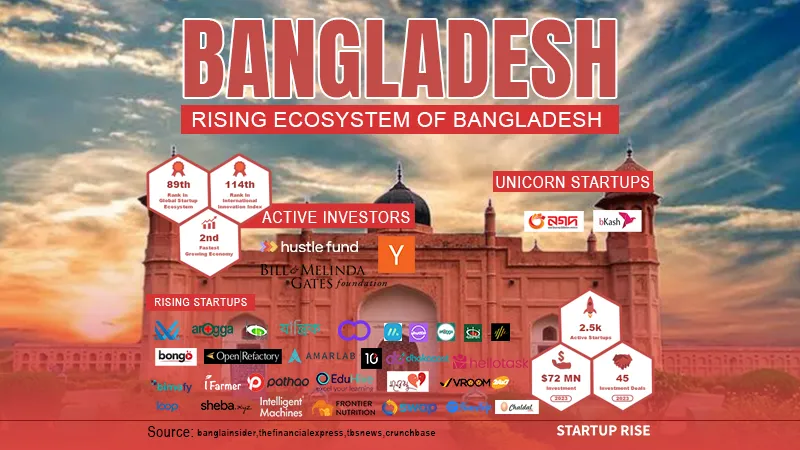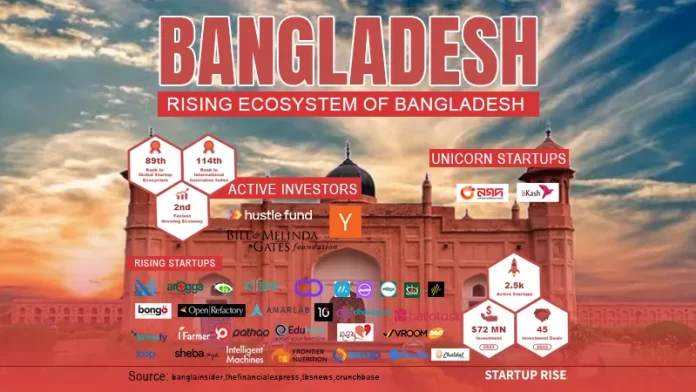
Introduction of the Startup Ecosystem of Bangladesh
The startup ecosystem in Bangladesh is on the rise. The country is experiencing an increasing flow of investments in the last quarter of 2024. Bangladesh ranks 83rd in the global startup ecosystem and 106th in the Global Innovation Index.
The startup ecosystem in Bangladesh is growing, with over 1,200 active startups and more than 200 new ones each year. The country’s industries include edtech, marketing and e-commerce. In late 2023, Bangladesh was projected by the Mastercard Economics Institute (MEI) to be the world’s second fastest-growing economy after India among 46 countries.
Growth and Investment in the Startup Ecosystem of Bangladesh
Despite a one-in-ten success rate for startups, investors and accelerators are attracted to Bangladesh’s growth potential. The government is actively supporting startups through startup funding, mentorship, and infrastructure initiatives.
In 2024, Bangladesh saw a decrease in foreign direct investment (FDI) to $1.47 billion, an 8.8% drop from the previous year. This decline is attributed to factors like difficulties in repatriating earnings, foreign exchange instability, economic uncertainties, the upcoming general election, loss of investor confidence, and a credit rating downgrade. In June 2024, FDI growth was just 0.3% of the country’s GDP, down from 0.4% the year before.
The Bangladesh government promotes foreign investment through institutions like BIDA (Bangladesh Investment Development Authority), offering a one-stop service for angel investors, including assistance with licenses, land acquisition, and aftercare. Additionally, initiatives like economic zones, simplified procedures, and tax incentives further encourage foreign direct investment (FDI).
Each startup in Bangladesh is known for innovation and a strong, efficient work structure. Bangladesh is positioned as a leading developing nation in South Asia due to its thriving startup ecosystem.
Companies like Y Combinator, the Bill and Melinda Gates Foundation, and Hustle Funds have shown interest in and invested in startups in Bangladesh. Currently, bKash and Nagad are the country’s two unicorn startups, with expectations that more unicorns will emerge in the near future.
Some Portfolio Startups | Rising Startup Ecosystem of Bangladesh
Zantrik
Founded in: 2018
Founded by: Farooque Shubho and Biplob Biswas
Headquarters: Dhaka, Bangladesh
Industry: Motor Vehicle Manufacturing Zantrik is driving the digital transformation of Bangladesh’s automobile industry. The company is bringing greater transparency, quality and value to car owners. The platform improves efficiency and accelerates growth for garages. Zantrik.com offers expert auto services repair tips and connects customers with trusted mechanics as Bangladesh’s leading car maintenance platform.
Hishab
Founded: 2015
Founded by: Zubair Ahmed
Headquarter: Singapore
Industry: IT Services and IT Consulting
Hishab, founded in Bangladesh, aims to create a global revolution using Generative Conversational AI, providing easy digital access to all citizens, regardless of their background, simply through phone calls. The company invests heavily in Research and Development to stay at the forefront of AI innovation, ensuring their solutions lead globally. Hishab’s mission is to create technology that adapts seamlessly to users, regardless of their digital literacy, empowering individuals and organizations with digital assistants to enhance their abilities and drive growth.
Adeffi
Founded in: 2019
Founded by: Binoy Barman
Headquarters: Dhaka, Bangladesh
Industry: Advertising Services
Adeffi is the leading out-of-home advertising platform in Bangladesh. The company is offering data-driven outdoor advertising solutions for brands. Adeffi is revolutionizing the advertising landscape as the country’s first advertising marketplace by leveraging the gig economy and a tech-based platform.
Pavilion
Founded in: 2014
Founded by: Priyom Mozumdar and Mostakim Hossain
Headquarters: Dhaka, Bangladesh
Industry: Spectator Sports
Pavilion is a sports news and content startup. The company has a goal of fostering a sports-loving nation that supports sports in a meaningful way. It provides news, videos, photos, score updates and blogs which covers cricket, football and tennis. Pavilion also offers information on amateur players and develops tech products like a live score engine and tournament management system. The startup is supported by funding from Startup Bangladesh and investment from Smart Bangladesh Accelerator.
Arogga App
Founded in: 2020
Founded by: Rosina Mazumder, Fahad Hossain, Shamim Hasan and Yawar Mehboob
Headquarters: Dhaka, Bangladesh
Industry: Health, Wellness & Fitness
Arogga is a healthcare app that delivers prescription and over-the-counter medicines directly to your doorstep. The app also offers health information, doctor booking services, and features like real-time order tracking and reward points. Arogga provides a wide range of products, which includes medicines, vitamins, supplements, herbal products, beauty items, pain relievers and lab tests. Arogga makes healthcare more accessible and convenient by allowing users to upload prescriptions and receive safe, fast delivery as Bangladesh’s first mega online pharmacy. The company’s mission is to offer affordable and convenient access to everyday healthcare needs for the people of Bangladesh.
Bongo
Founded in: 2013
Founded by: Ahad Mohammad, Navidul Huq and Fayaz Taher
Headquarters: Dhaka, Bangladesh
Industry: Online Media
Bongo is a leading South Asian OTT and VOD platform. The platform offers a vast content library and advanced video delivery technology. It also manages a network of over 500 YouTube channels and influencers across five countries, with more than 83 million subscribers and a monthly reach of 210 million unique viewers. Bongo partners with telecom operators to provide premium content as the market leader in Bangladesh. The company is capitalizing on the growing local market.
MedEasy
Founded in: 2020
Founded by: Arefin Zaman
Headquarters: Dhaka, Bangladesh
Industry: Wellness and Fitness Services
MedEasy is Bangladesh’s leading digital healthcare platform. The company is offering video consultations with licensed doctors from 23 specialties and medicine delivery across the country. The app also provides doorstep diagnostic services. MedEasy connects users with doctors via video calls and ensures convenient access to healthcare services as the top online pharmacy and healthcare app.
Markopolo
Founded in: 2021
Founded by: Tasfia Tasbin, Mubtaseem Zaman and Rubaiyat Farhan.
Headquarters: Dhaka, Bangladesh
Industry: Information Technology & Services
Markopolo.ai is a Bangladesh-based startup offering AI-powered marketing solutions tailored for small and medium-sized businesses (SMEs). Their platform helps businesses create, distribute and optimize content using machine learning and data visualization to better understand their customers and market. The company’s services include strategy creation, ad creation and optimization, automated caption generators, AI-generated branding creatives, campaign analytics and social media marketing boosting.
Amar Lab
Founded in: 2021
Founded by: Tazin Shadid and Dr. Ishtique Zahid
Headquarters: Dhaka, Bangladesh
Industry: Hospitals and Health Care
AmarLab is the first and largest diagnostic marketplace in Bangladesh. The company is connecting customers with labs offering a wide range of affordable tests and delivering reports online within hours. This digital healthcare startup also provides at-home diagnostic test services, which is making healthcare more accessible for individuals who have difficulty traveling. AmarLab allows people to enjoy the convenience of diagnostic testing from the comfort of their home with this innovative service, without the need to visit diagnostic centers.
Intelligent Machines
Founded in: 2018
Founded by: Mohammad Oli Ahad
Headquarters: Dhaka, Bangladesh
Industry: Technology, Information and Internet
Intelligent Machines is a startup that leverages artificial intelligence (AI) and advanced analytics to help businesses improve operations. They offer AI products such as computer vision, fraud detection, audio recognition and precision marketing analytics. The company’s mission is to create local AI solutions for regional challenges and to prevent brain drain from Bangladesh. Intelligent Machines offers unlimited leave, performance-based salaries and leadership opportunities for undergraduates with a unique work culture.
Paperfly
Founded in: 2016
Founded By: Shahriar Hasan
Headquarters: Dhaka, Bangladesh
Industry: Ecommerce & Retail
Paperfly is one of Bangladesh’s top e-commerce delivery companies that helps online businesses send their products to customers easily and quickly across the country. It provides simple, fast, and reliable delivery services, making sure parcels reach customers safely and on time, so online sellers can focus on growing their business without worrying about logistics.
ShopUp
Founded in: 2017
Founded by: Navaneetha Krishnan Jaganathan, Sujayath Ali, Afeef Zaman, Ataur Rahim Chowdhury and Siffat Sarwar
Headquarters: Dhaka, Bangladesh
Industry: Ecommerce & Retail
ShopUp is a business-to-business (B2B) platform from Bangladesh that helps small shop owners run their businesses more easily. It allows them to buy products in bulk, get fast delivery to their shops, access digital credit and pay later (BNPL), and use simple tools to manage their business.
Conclusion
The Startup Ecosystem of Bangladesh is blooming due to digitization, changes in demographics, and supportive government policies. However, challenges like limited funding access and complex regulations persist. There’s a mixed perception of startups, with some outsiders believing founders are exploiting investors, but the country is still accelerating the pace of startup investments in the country.
FAQs
What is the success rate of startups in Bangladesh?
In 2020, 24% of companies ceased operations, while 56% of startups saw a revenue decline of at least 50%. With 60% of startups having less than three months of financial runway, this situation jeopardized 1.5 million jobs and resulted in an annual loss exceeding US$ 53 million.
How many startups are there in Bangladesh?
The startup ecosystem sees over 1,200 new startups each year at various stages and has raised USD 989 million since 2013. A total of 298 global and local investors have contributed to funding these ventures.
Is it good to start a business in Bangladesh?
Bangladesh is one of the fastest-growing economies in the world’s fastest-growing region. A new interim government has been appointed, focused on improving the business and foreign investment environment in the country.
What are the best startups in Bangladesh?
Watch out for top startups like ShopUp, Pathao, bKash, Sheba. xyz, Chaldal, Alice Labs, SureCash, Truck Lagbe, Dhaka Cast, and Paperfly leading innovation in e-commerce, fintech, AI, logistics, and healthcare.
What is the ranking of Bangladesh in innovation?
Bangladesh ranks 106th out of 133 economies in the Global Innovation Index (GII) 2024, which measures the innovation capabilities of countries worldwide.





